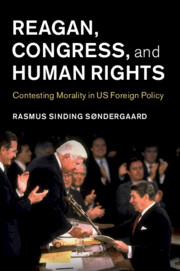‘In explaining how idealists in Congress forced the Reagan administration to embrace and recast human rights, Søndergaard reveals how profoundly the trajectory of US human rights policy was determined by contestation between the executive and the legislature. This richly researched book illuminates a poorly understood decade in the development of international human rights and recovers the role of overlooked actors, both in Congress and outside government.'
Barbara Keys - Durham University
‘An engaging and original contribution to our understanding of the place of human rights in US foreign policy in the 1980s. Rasmus Søndergaard is particularly effective in highlighting the significance of the newly-formed Congressional Human Rights Caucus (CHRC) and articulating what a ‘conservative' human rights policy meant during the Reagan years.'
Sarah B. Snyder - American University, Washington DC
‘Søndergaard makes an important contribution to our understanding of human rights in US Cold War foreign relations. Drawing on deep archival research, Reagan, Congress, and Human Rights convincingly illuminates how legislators on both sides of the political aisle influenced the Reagan administration's approach to the defining human rights issues of the 1980s.'
William Michael Schmidli - Universiteit Leiden
‘This excellent study examines how Congress asserted a role in incorporating human rights into the [Reagan] administration's foreign policy, especially through the bipartisan Congressional Human Rights Caucus (CHRC).’
A. J. Dunar
Source: Choice
‘The argument that it was the Congressional assertion of the importance of human rights that forced the Administration to make it a significant part of its foreign policy agenda is compelling. That this assertion was bipartisan and only contested in terms of the location of its application, rather than the principle itself, makes this argument all the more intriguing.’
Mark Hurst
Source: Diplomacy & Statecraft
‘The book will make a lasting contribution to our understanding of the foreign policy continuity across the final decades of the Cold War. Søndergaard has written a sequel to Barbara Keys’ Reclaiming American Virtue: The Human Rights Revolution of the 1970s (2014). Like her, he has obliged us to rethink easy caricatures of US power.’
Timothy J. Lynch
Source: Journal of Contemporary History
The persistence in contemporary debates of many of the political patterns highlighted by Søndergaard further underscores the importance of this book, which should be required reading for anyone interested in the domestic politics of human rights or legislative-executive relations on foreign policy.
Jordan Tama
Source: Diplomatica
'… an excellent study that challenges many previous understandings of Reagan’s foreign policy and the role of Congress in the 1980s. As Søndergaard demonstrates, while the administration’s use of human rights was selective and only genuinely pursued when connected to its anti-communist efforts, it nonetheless 'helped secure human rights as the key moral language in American foreign relations'.'
Kristina Spohr
Source: Diplomatic History
'The book will make a lasting contribution to our understanding of the foreign policy continuity across the final decades of the Cold War … Søndergaard reminds us that American politics is sometimes compromised but often advantaged by its endemic contestation over moral questions.'
Timothy J. Lynch
Source: Journal of Contemporary History



